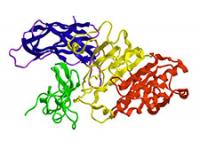Lipase is a pancreatic enzyme essential to your digestive system. The word “lipase” comes from the Greek word “lipos” which means fat. So it should be no surprise that its main function is to break down fats in the body into smaller more digestible components. Specifically, it converts the triglyceride component found in ingested fats into monoglycerides and two fatty acids. Incomplete digestion of fat allows fat to coat food particles and therefore interferes with the break down of other food components such as protein and carbohydrates. Normal digestion of dietary fat is accomplished by lipase and bile. The function of bile, which is produced in the liver and stored/released by the gallbladder, is to emulsify dietary fats to facilitate the work of the lipase. Large fat molecules offer relatively little surface area for lipase to work on. Bile breaks down the large fat molecule into tiny droplets which provides lipase with an enormously increased surface to work on. Among other things, incomplete digestion of fat allows fat to coat food particles, thus interfering with the breakdown of proteins and carbohydrates.
Since lipase digests fat and fat-soluble vitamins, people who are deficient in lipase may have a tendency towards high cholesterol, high triglycerides, difficulty losing weight, and either diabetes or prediabetes. Lipase deficient people also have decreased cell permeability, meaning nutrients cannot get in and the waste cannot get out. Lipase in the bloodstream modulates cell permeability so that nutrients can enter and wastes exit. Waste-eating enzymes (such as protease) may also be taken to help cleanse the blood of the unwanted debris. Lipase is typically found in raw, unheated foods that are high in unrefined fats and oils such as raw egg yolk and raw cream, but since we cook most of our foods, especially raw egg yolk, most need to supplement with lipase in both a digestive enzyme formula and a systemic enzyme formula to get its incredible health benefits in the digestive tracts as well as in the bloodstream. Since lipase is unique in that it helps digest fats in the digestive tract, as well as breaking down fats that make their way to the bloodstream and assisting in cellular metabolism, you can find lipase in Jon Barron’s Digestive Enzymes and his proteolytic enzyme formula, pHi-Zymes.
Some other health benefits include:
Improve Symptoms of Celiac Disease
People with celiac disease suffer from a variety of conditions from abdominal pain, bloating, weight loss, and fatigue. These symptoms are caused by damage to the intestinal tract from gluten, a protein found in grains. One side effect of the disease is the inability to produce adequate digestive secretions from the pancreas. Some studies have shown that supplementing with lipase may help with this issue.
Improve Digestion for People with Cystic Fibrosis
People diagnosed with cystic fibrosis tend to have insufficient pancreas function. Studies show that supplementing with pancreatic enzymes such as lipase can often lead to improved digestion, especially of fats.
Helps with Fat Digestion and Weight Loss
There are a number of studies that show that lipase can significantly increase the body’s ability to digest fat. One such study on people suffering from pancreatic diseases found that large servings of lipase helped stabilize fat digestion in up to 63% of participants. Other studies have shown that supplementing with lipase can help reduce lipid malabsorption and return fat digestion to optimal levels. As a result, supplementation with lipase can help control appetite and support healthy cholesterol and triglyceride levels
Helps Absorb Vitamins & Minerals More Efficiently
The general function of most digestive enzymes is to help you extract the energy and nutrients from the foods you eat. Lipase helps in this area by helping us avoid excessive fecal fat loss, which occurs when our bodies are unable to break down fats properly and extract the nutrients needed from our food. Proper levels of lipase allows the body to extract vital nutrients and also allows the proper digestion of essential fatty acids.
Decreases Symptoms of Digestive Upset
There are a variety of conditions associated with digestive upset including abdominal pain, bloating, vomiting, nausea, heartburn, gas, and loss of appetite. One study of hospital patients showed that supplementing with lipase helped reduce these symptoms. In fact, after eight weeks of use, many of the symptoms were significantly improved in the participants taking the lipase supplement.
As you can see, there are many benefits associated with this enzyme. Unfortunately, the modern diet is essentially an enzyme-deficient diet – that is, a diet high in cooked and processed foods which leads to a deficiency in natural enzymes, especially lipase as we noted earlier because it is in most foods we typically cook. If you are like most people who cook these types of foods, you will more than likely benefit from supplementing with digestive enzymes such as lipase. A deficiency or imbalance in lipase in particular can play a major role in a variety of health issues including:
- indigestion
- heartburn
- bloating
- gas
- high cholesterol
- high triglycerides
- difficulty losing weight
- diabetes or prediabetes
And even if you eat properly, studies have shown that as you age, your production of the pancreatic enzymes decreases. What this all means is that for optimal health, unless you’re living on an all raw food diet, you need to be supplementing with digestive enzymes that include lipase. Insufficient live digestive enzymes in the diet force the pancreas to overwork and overstress resulting in long-term, non-acute enlargement of the pancreas. Using digestive enzymes, such as Jon Barron’s Digestive Enzymes, with every meal is one of the simplest things you can do to improve the health of your pancreas, which would otherwise need to produce the required enzymes, as well as taking stress off your gallbladder and liver. And finally, as we mentioned earlier, protein absorption from fatty foods such as fish or seeds can be improved by incorporating supplemental lipase enzymes in the diet.
Do not take any type of proteolytic enzyme: if nursing or pregnant, if you have history of an ulcer, or if taking blood thinners. Do not take days before having elective surgery.
More about the health benefits of proteolytic enzymes.








